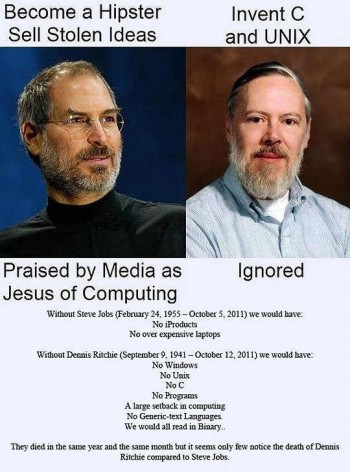Time to saddle up the rant stallion and take him out of the stable: This comes up from time to time on social media — as it did again several days ago — and it’s really about time it stops.
Dennis Ritchie and Steve Jobs died pretty close to each other, time-wise. That may sound like the start of a joke — “Dennis Ritchie and Steve Jobs meet at the pearly gates, and…” — but we’re not going there today. Many people are under the impression that while Steve Jobs got all the attention as the “messiah of computing” when he died, Dennis Ritchie was completely ignored.

Click to enlarge
Clearly, Dennis Ritchie did more for technology and personal computing than Steve Jobs did. Thoughtful people understand this. Ritchie was a pioneer, and Jobs benefited from the trail Ritchie blazed. Again, thoughtful people understand this. Steve Jobs was as much an “inventor” and “pioneer” of computing as Henry Ford was the “inventor” of the automobile, and here’s where the parallel comes into view.
Like Ford, Jobs took something others had already started, oversaw improvements in design, marketed the crap out of it, and made Apple the tech giant that it is today. That’s pretty much his legacy, nothing more and nothing less. And thoughtful people know this.
Without Ritchie, there is no Jobs, to say nothing of there not being a lot of things we have today. Would someone else have invented them? Perhaps, but that’s going off-topic for now. Ritchie made the foundation and, for better or worse in your opinion, Jobs built on it. And thoughtful people know this.
I could bring the Edison-versus-Tesla thing into this, but I know you get the point.
Here’s another point which should be given some thought: FOSS advocates put themselves at a huge disadvantage by whining about things like this. Seriously. In large part Jobs was a showman, a celebrity, and he was given celebrity treatment in his passing. As a celebrity, he’s also being taken down a notch or two in books and in film. On the other hand, Ritchie was an inventor, and while he may not receive the widespread attention that a celebrity might, Ritchie’s colleagues and everyone in the industry knows and appreciates his contributions, to say nothing of giving him the vast credit due for his contributions.
Let’s stop complaining about this, and focus instead on the fact that FOSS continues to lead innovation in the tech field, whether credit is given to us or not.
Help keep FOSS Force strong. If you like this article, become a subscriber.









I think we would still have had a Jobs without Ritchie, but we would all still be using ProDOS. Without Woz and Ritchie, we would all be living in a fruit orchard near Ukiah. 😉
It’s true that Jobs is much more well known and recognized than Ritchie. The inventor is not as well known as the businessman. That’s par for the course. This seems to nearly always be the case. People who develop others’ inventions into marketable products get recognition. Often they get recognition as an inventor. That part of it annoys me (not that they get recognition, just the inaccuracy of the recognition).
It would be nice if people realized that Jobs’s strength was in design and marketing rather than technology, but that’s not the way it is. In large part, it’s the marketing that seems to be to blame. Whoever first markets a product successfully gets credit for that product regardless of the fact that they almost never were the inventor.
Yeah I can’t remember when apple release swift there were people asking where would apple be without gcc or llvm. I think this is not just in the history of computing that this happens. While at UCLA I took a course about the real Adam Smith I heard my professor George Murphy call something a rational reconstruction to rewrite history to come with the view. Even in pure history class es I have heard that John Locke’s ideas have been overblown in the enlightment in that day. It seems this is taking place in Computing similar to how things have been rewritten in Economics to get with the ideas of the day.
I wrote a very long and thoughtful response to Larry, but the system seems have eaten it.